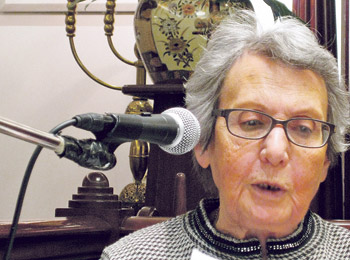MONTREAL — Sylvia Kedourie no longer stands when delivering a talk.
But at age 95, she can be forgiven. The editor of Middle Eastern Studies, one of the world’s pre-eminent English-language academic journals on the Middle East, Kedourie is still very much in charge and stands tall indeed.
This fall, the London-based journal is celebrating its 50th anniversary with a special issue, and Kedourie, speaking without notes recently at the Spanish & Portuguese synagogue, was articulate and vivid as she recounted the history and evolution of Middle Eastern Studies, which was founded in 1964 by Frank Cass, at the suggestion of her late husband, Middle East scholar Elie Kedourie.
The journal provides the most recent research on the history and politics of Arabic-speaking countries in the Middle East and North Africa, as well as on Turkey, Iran and Israel.
Elie Kedourie himself took over as founding editor soon after Cass launched the magazine – Cass remained in nominal control – and Elie and Sylvia spent the years that followed laboriously editing, proofreading, checking facts, approving and improving submissions.
Sylvia took over as editor when Elie died in 1992.
“He knew right away it would be a success,” Kedourie recalled, in large part because Middle Eastern Studies was a first-of-its-kind publication in the United Kingdom and North America.
From the start, she said, the journal, which publishes six times annually (it began with four), has kept its standards for publication stringent, defined by scholarship, non-partisanship and independence in examining the political, legal and economic history of the Middle Eastern world, not current affairs.
Articles must be good, Kedourie said, meaning “very original,” and not published or submitted elsewhere.
Publication is given the go-ahead by Kedourie herself in consultation with her daughter, Helen, who is associate editor. An article might be returned to the author several times for re-writing and tweaking, she said, and there can be an 18-month wait before it appears.
Even if Kedourie personally disagrees with the author, if an article meets the journal’s tough standards, it will run.
“In 50 years, we have never solicited for an article,” said Kedourie, who, like her late husband, was born in Baghdad and has retained ties with Montreal and “the Spanish,” as the synagogue is known, with its strong Iraqi-Jewish presence. “If an article is no good, we say, ‘Try somewhere else.’”
Still, Middle Eastern Studies has had to evolve, if not necessarily by choice, in the Internet age. It can be found on the website of Taylor & Francis, an academic publishing house: www.tandfonline.com.
Taylor & Francis describes the journal as “required reading for all those with a serious concern in understanding the modern Middle East.”
Kedourie said that while the transition to affiliation with Taylor & Francis, “after [my] doing it singlehandedly for 22 years,” has worked out well. Her daughter shares in the work of getting the journal out, but she has no intention of taking over Middle Eastern Studies after her mother is gone.
Kedourie said she is looking for a new editor, and the search continues, but the final product will have to preserve the journal’s historic legacy.
“The proof of the pudding is in the eating,” Kedourie said, “and the proof has been going on for 50 years.”
